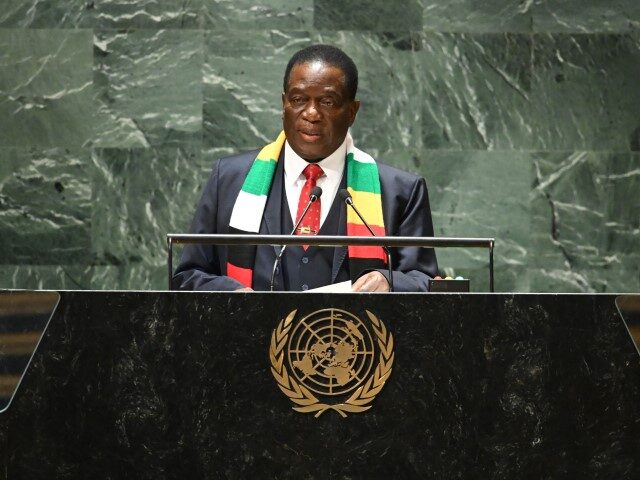Zimbabwe’s President Emmerson Mnangagwa boasted to the U.N. General Assembly on Thursday that his country has entrenched “democracy, constitutionalism, good governance, and the rule of law” under his leadership, and demanded the lifting of ongoing Western sanctions against Zimbabwe and every other country currently subjected to them.
Few international observers would agree with Mnagagwa’s characterization of Zimbabwe as a bastion of clean representative government. Mnagagwa’s government arrested dozens of the monitors assigned to the August 2023 election, allegedly for leaking election results ahead of time.
The opposition cried foul, complaining of “blatant and gigantic fraud,” including voter suppression and ballot rigging. International human rights groups described an atmosphere of “intimidation” against opponents of the ruling ZANU-PF party, which continued its unbroken 43-year streak in power.
As for Zimbabwe’s economy, the World Bank assessed that it consistently performs below the level that should be made possible by abundant natural resources and good human capital – not primarily because of sanctions, but due to “price and exchange rate instability, misallocation of productive resources, high informality, low investment, and limited structural transformation.”
“High inflation, multiple exchange rates, and unsustainable debt levels have increased the cost of production, reduced incentives for productivity-enhancing investment, and encouraged informality,” the World Bank maintains.
Sanctions against Zimbabwe have been imposed over interference with democratic processes and human rights abuses. In December 2022, the U.S. Treasury Department imposed more sanctions against individuals and entities for these reasons, emphasizing that the action did not “target the Zimbabwean people, the country of Zimbabwe, or Zimbabwe’s banking sector.”
The Treasury Department urged Mnangagwa’s government to “take meaningful steps towards creating a peaceful, prosperous, and politically vibrant Zimbabwe, and to address the root causes of many of Zimbabwe’s ills: corrupt elites and their abuse of the country’s institutions for their personal benefit.”
Mnangagwa ignored all of these analyses and criticisms to blame sanctions for keeping Zimbabwe from reaching its “sustainable development goals.”
“Zimbabwe has been under the illegal, unilateral economic sanctions for 23 years, imposed by some Western countries. These sanctions were designed to subjugate the sovereign will of the Zimbabwean people,” he declared.
“We, therefore, demand that the unjustified unilateral sanctions be unconditionally lifted, including those imposed on countries like Cuba. We remain grateful for the support and solidarity of progressive countries in the comity of nations,” he said, seemingly forgetting that he came to power after the overthrow of longtime despot Robert Mugabe, his former patron and employer.
Mnangagwa segued from complaining about sanctions to touting Zimbabwe’s “unprecedented development and economic success,” which made his country “the fastest-growing economy in our Southern African region” for the past three years.
“Further, Zimbabwe is prioritizing the eradication of poverty and improving the quality of life of our people, particularly, those in rural areas. The empowerment and capacitation of communal and small-scale farmers has seen us realize food and nutrition security at both household and national level,” he said.
Zimbabwean agriculture has been on the upswing over the past few years, in part because the government wooed back white farmers whose land was seized under the Mugabe regime and promised them secure 99-year leases on their farms. Mnangagwa also made it easier for young Zimbabweans to run their own small farms, an opportunity seized by youths who could not find employment in other professions.
Mnangagwa sidestepped the somewhat awkward image of degreed young professionals realizing their best chance to make a good living was to collect government subsidies and grow potatoes. He boasted of Zimbabwe’s investments in “science, technology, and innovation,” including programs that have “refocused young people in our tertiary institutions toward developing and producing goods and services.”
Mnangagwa spoke at length on climate change, offering his condolences to Morocco and Libya for “the recent loss of lives as a result of the devastating impact of climate change,” which had nothing to do with the loss of life in either country.
Morocco suffered an earthquake, while Libya endured thousands of casualties from flooding because it lacks functioning governments, so early weather warnings were ignored and dams that had not been maintained for years collapsed.
Mnangagwa knew that climate change gets terrific mileage at the U.N., so he really stepped on the gas:
There is need for concrete climate action, as opposed to mere promises, so that we strengthen our adaption, resilience and mitigation mechanisms. We must transition to a low-carbon and resilient global economy by increasing investments in renewable energy, sustainable agriculture and green infrastructure.
Commitments made under the United Nations Framework Convention on Climate Change and the Paris Agreement must be honored to deliver climate justice. It is our hope that progress will be made to operationalize the Loss and Damage Fund.
Zimbabwe is implementing a Climate Change Policy and Response Strategy while disaster management and early warning systems continue to be strengthened.
Mnangagwa had many demands for the international financial system, including more stimulus spending for developing nations, more loans, and “the use of modalities such as debt cancellation and restructuring as stimulus for developing countries to grow their economies and build greater resilience.”
“We strongly condemn tendencies by some powerful countries who preach peace, human rights and democracy and yet clandestinely fund conflicts and the unconstitutional changes of governments for their own narrow interests,” he said.
“We further condemn the use of unilateral and illegal sanctions as a foreign policy tool at the disposal of some powerful nations, such as those sanctions imposed on Zimbabwe and countries like Cuba. Such actions hamper the trust, global solidarity and multilateralism we desire,” he added, repeating his call for an end to Western human rights sanctions.

COMMENTS
Please let us know if you're having issues with commenting.